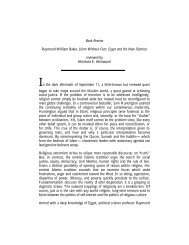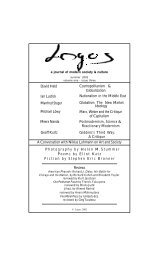Michael J. Thompson Stephen Eric Bronner Wadood Hamad - Logos
Michael J. Thompson Stephen Eric Bronner Wadood Hamad - Logos
Michael J. Thompson Stephen Eric Bronner Wadood Hamad - Logos
Create successful ePaper yourself
Turn your PDF publications into a flip-book with our unique Google optimized e-Paper software.
Jason Schulman<br />
Testament authors for demonizing the Jews and inciting hatred against them<br />
as the murderers of Christ in his book, The Foundations of Christianity; Lenin<br />
wrote “it is not the Jews who are the enemies of the working people” but “the<br />
capitalists of all countries.” 2<br />
Muravchik claims that Marx and Engels “reconnected socialism to the thrill<br />
of violence”—as if they ever supported violence for its own sake, or ever said<br />
that countries which were sufficiently democratic and non-militarized might<br />
achieve socialism by peaceful means. He dismisses Capital as “ponderous”<br />
and “blather”; one wonders what the noted conservative economist Joseph<br />
Schumpeter saw in it. (Of course, Schumpeter could understand the<br />
difference between use-value and exchange-value; Muravchik is confounded<br />
by such stuff. Then again, he terms class struggle to be “high theory,” i.e., not<br />
real.)<br />
He attacks the duo for seeing themselves as “leaders of the proletariat”—<br />
never part of Marx and Engels’s self-description—despite their lack of<br />
working class roots. Indeed, this is a frequent theme in Muravchik’s book:<br />
real workers always become, at the most, reformist social democrats, while<br />
revolutionaries are always from the affluent classes (this former member of<br />
the American SP seems to know nothing of Eugene Debs’s background) and<br />
socialism itself is ultimately an ideology imported into the working class by<br />
intellectuals from outside it. Irony of ironies, Muravchik’s view is a sort of<br />
inverted Trotskyism: it is socialism, not ordinary reformism, which represents<br />
the influence of “alien class forces” on the proletariat! Missing in all this is<br />
any acknowledgement of the commitment by Marx and Engels to “winning<br />
the battle of democracy,” as The Communist Manifesto puts it, or any<br />
examination of their role in transforming socialism from a doctrine of<br />
wealthy colony-founders and secret conspirators to a doctrine of workingclass<br />
self-emancipation from exploitation. A serious critique of Marx and<br />
Engels would comment on their real flaws: their denigration of the role of<br />
moral values and individual rights in promoting socialist goals and their<br />
belief that an abundant communist society would transcend the need to<br />
deliberate politically about its economic priorities. Instead, Muravchik merely<br />
offers the conservative same-old same-old.<br />
Muravchik is far nicer to Eduard Bernstein, who embraced the goals of<br />
“more political and social legislation, better pay and working conditions”<br />
while abandoning the idea of a socialist “final goal.” While in retrospect,<br />
Bernstein’s rejection of orthodox Marxist teleology was correct, the ultimate<br />
<strong>Logos</strong> 2.3 – Summer 2003




